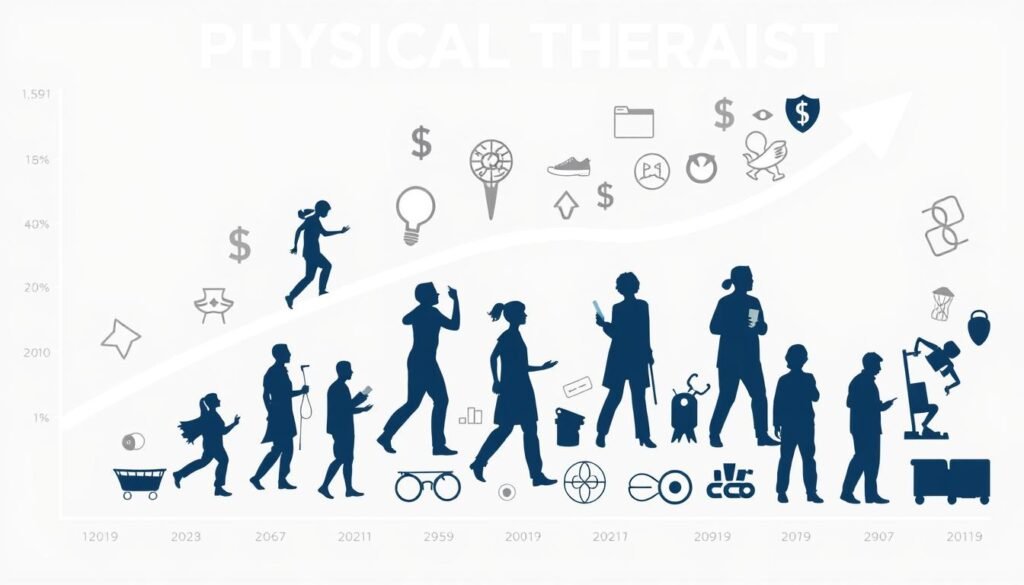Table of Contents Show
Understanding the physical therapist salary is key for those thinking about this career. If you’re curious about how much physical therapists earn, you’re not the only one. The salary can change based on experience, location, and specialty. We’ll look into the average salaries and what affects them in this article.
Knowing the salary range for physical therapists can guide your career choices. The salary is a big factor for those considering this rewarding field. By understanding what impacts pay, you can make better career decisions.
Key Takeaways
- Average physical therapist salary ranges vary by location and experience
- Specialization can impact physical therapist earnings
- Understanding the factors that influence pay can help inform career decisions
- Physical therapist salary is an important consideration for those entering the profession
- Experience and location are key factors in determining physical therapist salary
Understanding the Physical Therapy Profession
Physical therapy is a fulfilling career that needs a lot of education and hard work. Physical therapists earn a good pt salary. Their earnings depend on where they work, how long they’ve been doing it, and their specialty. To start, you need a bachelor’s degree in a related field, then a Doctor of Physical Therapy (DPT) degree.
Getting to be a physical therapist takes a lot of time and effort. Most programs last at least 6 years after high school. After school, you must get licensed and certified in your state. This means passing the National Physical Therapy Examination (NPTE) and meeting state requirements.
Educational Requirements
- Bachelor’s degree in a related field (e.g. biology, psychology)
- Doctor of Physical Therapy (DPT) degree
- Licensure and certification in the state of practice
Licensing and Certification
Physical therapists also need to get licensed and certified in their state. This means passing the NPTE and meeting state-specific requirements.
Career Paths Available
Physical therapists can choose from many career paths. They can specialize in sports medicine, pediatrics, or geriatrics. With more people needing physical therapy, physical therapist earnings are likely to stay high. This makes it a rewarding and profitable career.
Average Physical Therapist Salary in the United States
The average salary for physical therapists in the United States is a key factor to consider. Recent data shows the median annual salary is around $90,000. Salaries can range from $70,000 to over $110,000, depending on location, experience, and specialty.
Here are some key points to consider when looking at the average salary for physical therapist:
- Median annual salary: $90,000
- Physical therapist pay scale: $70,000 – $110,000
- Top-paying industries: hospitals, outpatient clinics, and private practices
Salaries can vary a lot based on the work setting and location. For example, physical therapists in urban areas often earn more than those in rural areas. Also, those with specialized certifications or advanced degrees may earn higher salaries.
The average salary for physical therapists in the United States is competitive with other healthcare jobs. The physical therapist pay scale offers chances for advancement and growth. By understanding what affects salaries and staying updated on industry trends, physical therapists can make informed career decisions and negotiate fair pay.
| Industry | Median Salary |
|---|---|
| Hospitals | $95,000 |
| Outpatient clinics | $90,000 |
| Private practices | $100,000 |
Factors Influencing Physical Therapist Pay
Physical therapist pay can change a lot based on different things. Knowing these can help them plan their careers better. The salary range for physical therapists depends on their experience, education, specialization, and where they work.
How long a physical therapist has been working is a big factor in their pay. Usually, those with more experience make more money. Specialization areas also play a part, with some needing more training and paying more.
Experience Level Impact
- Entry-level physical therapists start with a lower salary
- Mid-level physical therapists see their salary go up as they gain more experience
- Senior-level physical therapists earn the most due to their long experience and skills
The place where a physical therapist works also affects their salary. Those in hospitals or private practices might make different amounts than those in clinics or rehab centers. Their education level can also impact their salary, with more education often leading to higher pay.
Specialization Areas
Physical therapists in special areas like sports medicine, pediatrics, or gerontology might earn differently. Their pay can change based on location, experience, and how much demand there is for their services.
Geographic Salary Variations
Location greatly affects physical therapist income. The cost of living and demand for services change across the United States. This leads to different salary ranges for physical therapists. Let’s look at the states and cities with the highest and lowest average salaries.
California, New York, and Texas are among the top-paying states for physical therapists. They offer average salaries between $95,000 and $110,000 per year. In contrast, Mississippi, Arkansas, and Alabama have lower average salaries, ranging from $75,000 to $85,000 per year. These differences are due to cost of living, population density, and job availability.
Here’s a breakdown of the average salaries for physical therapists in different cities:
- San Francisco, CA: $115,000 per year
- New York City, NY: $105,000 per year
- Los Angeles, CA: $100,000 per year
- Chicago, IL: $90,000 per year
- Houston, TX: $85,000 per year
Understanding these salary variations helps physical therapists make better career choices. By considering cost of living, job demand, and competition, they can negotiate a fair salary. This affects their physical therapist income and job satisfaction.
How Much Do Physical Therapists Make By Experience Level
As physical therapists gain experience, their physical therapist salary goes up a lot. The amount of experience a physical therapist has is very important for their pay. Usually, the more experience, the higher the pt salary.
Here’s what physical therapists can earn at different experience levels:
- Entry-level physical therapists (0-3 years of experience): $60,000 – $80,000 per year
- Mid-career physical therapists (4-7 years of experience): $80,000 – $100,000 per year
- Senior-level physical therapists (8-12 years of experience): $100,000 – $120,000 per year
Keep in mind, these figures are just estimates. They can change based on where you work, who you work for, and your specialty. But, this gives you a rough idea of what to expect as you move up in your career.
The physical therapist salary and pt salary can really vary with experience. As you get more experience, your pay will likely go up. This makes being a physical therapist a rewarding and profitable career choice.
| Experience Level | Salary Range |
|---|---|
| Entry-level | $60,000 – $80,000 |
| Mid-career | $80,000 – $100,000 |
| Senior-level | $100,000 – $120,000 |
Benefits and Additional Compensation
Physical therapists earn more than just their base salary. They get various benefits and extra pay that boost their total earnings. These perks include health insurance, retirement plans, paid time off, and money for continuing education. These help them grow in their careers and stay financially stable.
Some employers give physical therapists bonuses or incentives. For example, a physical therapist in private practice might get a bonus for high patient satisfaction or for introducing new treatments. This extra money can make a big difference in their earnings.
Physical therapists also get money back for professional growth. This includes going to conferences or workshops. It helps them keep up with new techniques and research. By looking at all these extra pay sources, physical therapists can understand their total earnings better. This helps them make smart choices about their careers.
Some important benefits that affect physical therapist pay are:
- Health insurance and retirement plans
- Paid time off and vacation days
- Continuing education allowances and professional development opportunities
- Bonuses and incentives for meeting performance targets
By considering these benefits, physical therapists can see their total earnings more clearly. This helps them plan their careers for better job satisfaction and financial security.
Private Practice vs. Hospital Employment
Thinking about a career as a physical therapist means considering where you’ll work. This choice affects your physical therapist pay scale. You might choose between private practice or working in a hospital. Each option has its own benefits and drawbacks.
In private practice, you might have more control over your schedule. This could mean a more flexible pt salary range. But, you’ll also have to handle business tasks like marketing and administration. On the other hand, hospital jobs offer a steady schedule and more resources.
Private Practice Income
Private practice physical therapists can earn more, setting their own fees. But, they must cover business costs like rent and staff salaries.
Hospital-Based Compensation
Hospital physical therapists usually get a salary, from $80,000 to over $110,000 a year. This depends on experience and location. They also get benefits like health insurance and paid time off.
Outpatient Clinic Earnings
Outpatient clinics offer salaries from $70,000 to over $100,000 a year. They provide a steady schedule and a variety of patients, including those with sports injuries.
Choosing between private practice, hospitals, or clinics depends on your goals and preferences. By looking at the pt salary range and other factors, you can decide what’s best for you.
Career Advancement and Salary Growth
As a physical therapist, your career and salary can grow with experience, education, and specialization. The average salary for physical therapist changes a lot based on these factors. To make more money, physical therapists can get extra certifications, lead teams, or focus on areas like sports medicine or pediatrics.
Experience is a big factor in physical therapist income. More experience leads to better jobs, like clinic directors or department heads, which pay more. Specializing in areas like orthopedics or neurology can also boost your salary.
- Pursue more certifications or specializations
- Take on leadership roles or mentor others
- Stay current with new research and technologies
- Network with other professionals for new opportunities
By focusing on career growth and professional development, physical therapists can earn more. With the right mix of experience, education, and specialization, they can have a fulfilling and profitable career.
| Level of Experience | Average Salary |
|---|---|
| Entry-level (0-3 years) | $60,000 – $80,000 |
| Mid-level (4-7 years) | $80,000 – $110,000 |
| Senior-level (8-12 years) | $110,000 – $140,000 |
Industry Trends Affecting PT Salaries
The healthcare world is always changing, and these shifts can greatly affect physical therapist pay. It’s key for physical therapists to keep up with trends to do well in their careers and earn more. New tech, like telehealth, can help physical therapy reach more people and might raise earnings.
Changes in who makes up the population also matter a lot. As more people get older, they might need more physical therapy. This could lead to higher pay for physical therapists. Also, changes in healthcare laws can affect how much physical therapists get paid and how easy it is to get care.
- More focus on preventing health problems could mean more work for physical therapists.
- There’s a growing need for specialized physical therapy, like for sports or kids.
- Telehealth services could let physical therapists see more patients and earn more.
By keeping up with these trends, physical therapists can set themselves up for success. They can use their skills to earn a good salary. As the healthcare world keeps changing, knowing these trends will help physical therapists make more money and move up in their careers.
| Trend | Potential Impact on PT Salaries |
|---|---|
| Healthcare Reform | Variable, depending on reimbursement rates and access to care |
| Technology Integration | Potentially positive, through expanded service reach and efficiency |
| Demographic Shifts | Potentially positive, due to increased demand for services |
Comparing PT Salaries to Other Healthcare Professions
Thinking about a career in physical therapy? It’s key to know how pt salary stacks up against other healthcare jobs. Physical therapist earnings play a big role in choosing a career. In the U.S., physical therapists can make a good living, with median physical therapist earnings between $85,000 and over $100,000 a year. This depends on experience and where you work.
Let’s look at some salary ranges for other healthcare jobs:
- Occupational Therapists: $60,000 – $90,000 per year
- Speech-Language Pathologists: $70,000 – $100,000 per year
- Registered Nurses: $60,000 – $100,000 per year
These numbers show that pt salary is on par with other healthcare careers. But, think about career growth too. Physical therapists can specialize in areas like sports or pediatric therapy. This can affect physical therapist earnings.
In short, while pt salary matters, it’s not everything. Knowing salary ranges and career growth chances helps make a smart career choice. This way, you can decide on a path that fits your goals and physical therapist earnings.
| Profession | Median Salary | Job Outlook |
|---|---|---|
| Physical Therapist | $85,000 – $100,000 | 18% growth |
| Occupational Therapist | $60,000 – $90,000 | 16% growth |
| Speech-Language Pathologist | $70,000 – $100,000 | 25% growth |
Negotiating Your Physical Therapist Salary
When you’re ready to talk about your physical therapist compensation, be ready and confident. Knowing the pt salary range in your area is key. Think about your experience, education, and special skills to show your value.
It’s important to show off your unique skills and experiences. Make a list of your achievements and qualifications. Talk about how they can help your future employer. Mention any special training, certifications, or positive feedback from past jobs.
- Being confident and assertive in your negotiation
- Being open to compromise and finding a mutually beneficial agreement
- Doing your research and knowing the current pt salary range in your area
- Highlighting your unique skills and experiences
By being prepared and confident, you can negotiate a good physical therapist compensation. Stay calm and professional. Don’t be shy about showing your worth.
Negotiating your salary is not just about getting the highest number, it’s about finding a fair and mutually beneficial agreement that reflects your value as a physical therapist.
| Factor | Impact on Salary |
|---|---|
| Experience Level | Significant impact, with more experienced physical therapists earning higher salaries |
| Education | Some impact, with physical therapists holding advanced degrees or specialized certifications earning higher salaries |
| Specialized Skills | Significant impact, with physical therapists possessing unique skills or certifications earning higher salaries |
Conclusion
Starting your career as a physical therapist opens up many opportunities. You can increase your physical therapist income by learning more, improving your skills, and keeping up with trends. Whether you want to move up in a hospital, start your own practice, or focus on a specific area of physical therapy, being flexible and proactive is key.
The physical therapist pay scale can change based on your experience, area of focus, and where you work. With hard work and smart planning, you can achieve financial success. Keep up with healthcare changes, use new technology, and look into different career paths that excite you. This way, you’ll not only earn more but also help your patients in meaningful ways.











